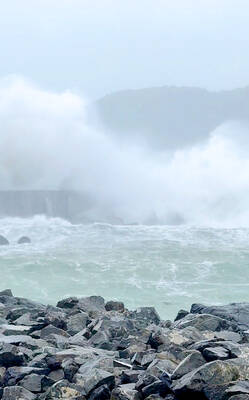The head of Australia’s foreign intelligence service has used a rare public address to suggest that an increasing number of disillusioned Chinese officials are willing to cooperate with the agency.
Australian Secret Intelligence Service (ASIS) director-general Paul Symon addressed a range of topics related to Australia’s foreign intelligence operations, including the recent Solomon Islands-China security pact and the need to recruit new spies “with more vigor and urgency” than ever before.
Speaking at a Sydney event hosted by the Lowy Institute to mark ASIS’ 70th anniversary, he said the audience, which included high ranking members of Australia’s intelligence community and top diplomats, would have to “occasionally read between the lines.”
However, he was fairly upfront in some of his comments on China, saying there were “more and more signs of officials [and] individuals interested in a relationship” due to their concerns about “an enforced monoculture.”
Symon said that his organization needs to “remain low-profile but ... not have no profile” as it seeks to adapt to the modern intelligence gathering environment.
“The world is experiencing more than just a realignment in power. The global rules-based order is being manipulated and subverted. The future will likely be less advantageous to Australia than that we once knew,” Symon said.
Emerging technologies are posing “a near-existential” risk to the work of services such as ASIS, with Australia’s covert activities becoming “increasingly discoverable,” he said.
“As we move forward, ASIS will need more officers with more diverse skills and backgrounds supported by more integrated capabilities. We are going to need to recruit and work with even more vigor and urgency than at any other point in our 70-year history,” Symon said.
“At the same time as our operating environment has become more competitive and volatile, it has also become increasingly difficult to conduct human intelligence work,” he said.
Symon said that while human intelligence “remains a core component of statecraft, it must adapt to meet the extraordinary challenges arising from the interaction of a complex strategic environment, intensified counter-intelligence efforts, and emergent and emerging technologies.”
“For a service like my own, there is a near-existential dimension to technology risk. The analogue systems and processes which spies of the past took for granted have been relegated to history, and we now live in a fundamentally digital era where our covert activities are increasingly discoverable,” he said. “In this technological sandbox, authoritarian regimes are having a heyday.”
Symon also said that ASIS “inserted” a “small team” of officers into Afghanistan as the Taliban seized power last year, including officers in the “chaos” of crowds seeking to leave the country at Kabul’s Hamid Karzai International Airport, as they facilitated evacuations.
SPEAKING UP
Symon also seemed to suggest that Chinese officials and residents are increasingly looking to provide ASIS with intelligence.
In a conversation with Lowy Institute executive director Michael Fullilove, Symon was asked how ASIS gains human intelligence without coercion, and said that more “officials, individuals unhappy with the trajectory of closed societies are willing to speak up, are willing to take risks.”
Symon compared China with India where he said that “the diversity in the color of ancient culture ... and the extent to which that diversity is so rich and so alive.”
“Yet in China, we have an ancient culture, but there’s an enforced monoculture that’s being enforced. We don’t yet know exactly how that will play out, but what we’re seeing is more and more signs of officials [and] individuals interested in a relationship,” he said.
“That’s not coercion, that is very real concern about their culture, the lack of diversity in their culture and the direction that they’re heading in,” Symon said.
ETHICAL QUESTIONS
Asked how ASIS factors ethical and legal questions into its operations, Symon said that for officers who decide to opt out of an operation because they are uncomfortable about a task or have concerns with its legality, he has given them an undertaking that it would not be detrimental to their career.
“It doesn’t happen in great numbers, it happens occasionally,” Symon said, adding that these officers sometimes then speak with an ethics counselor and opt back in to an operation.
SOLOMON ISLANDS
Symon was also asked about the security pact signed between China and the Solomon Islands.
He had traveled to Honiara for urgent talks with Solomon Islands Prime Minister Manasseh Sogavare before the deal was signed.
Speaking about the state of democracies in general, Symon said: “what I do see, not so much in Australia, but I see in our region, the extent to which the democratic systems in our region can be manipulated.”
“Political leaders can be subverted, can be directed and controlled, can take advantage of largesse that has been showered upon them,” he said. “Our job really is to help the government know and understand exactly what is going on and as people are commenting, denying, responding to activities of, I won’t say coercion, but manipulation.”
“It’s important that we reveal for our government that they know and understand exactly what is happening in that area,” Symon said.
Symon also pointed to Australia sending troops and federal police to Honiara at the request of the government as it faced unrest in November last year.
“For me, the approach that we took in that very rapid period of time, typified the way that we look to support the Solomon Islands and it’s not what I see other countries in the way other countries are considering the type of support they wish to give the Solomon Islands,” he said. “For me, that’s what good looks like.”
Symon said the intelligence community had been “very seized” by the security pact with China, and that ASIS would continue gathering and sharing intelligence relevant to the Solomon Islands.

FEROCIOUS FISH-EATER Scientists have found a new species of dinosaur from the Cretaceous Period, a ‘hell heron’ that stalked the rivers, deep in the Saharan desert At a remote Sahara desert site in Niger, scientists have unearthed fossils of a new species of Spinosaurus, among the biggest of the meat-eating dinosaurs, notable for its large blade-shaped head crest and jaws bearing interlocking teeth for snaring fish. It prowled a forested inland environment and strode into rivers to catch sizable fish like a modern-day wading bird — a “hell heron,” as one of the researchers put it, considering it was about 12 meters long and weighed 5-7 tons. The dinosaur presented a striking profile on the Cretaceous Period landscape of Africa some 95 million years ago as it hunted

Heavy rain and strong winds yesterday disrupted flights, trains and ferries, forcing the closure of roads across large parts of New Zealand’s North Island, while snapping power links to tens of thousands. Domestic media reported a few flights had resumed operating by afternoon from the airport in Wellington, the capital, although cancelations were still widespread after airport authorities said most morning flights were disrupted. Air New Zealand said it hoped to resume services when conditions ease later yesterday, after it paused operations at Wellington, Napier and Palmerston North airports. Online images showed flooded semi-rural neighborhoods, inundated homes, trees fallen on vehicles and collapsed

‘COST OF DEFECTION’: Duterte’s announcement could be an effort to keep allies in line with the promise of a return to power amid political uncertainty, an analyst said Philippine Vice President Sara Duterte yesterday announced she would run for president of the Southeast Asian nation of 116 million in 2028. Duterte, who is embroiled in a bitter feud with Philippine President Ferdinand Marcos Jr, was impeached last year only to see the country’s Supreme Court throw the case out over procedural issues. Her announcement comes just days before her father, former Philippine president Rodrigo Duterte, begins a pretrial hearing at the International Criminal Court (ICC) in the Netherlands over crimes against humanity allegedly committed as part of a brutal crackdown on drugs. “I offer my life, my strength and my future

NOT YET THERE: While the show was impressive, it failed to demonstrate their ability to move in unstructured environments, such as a factory floor, an expert said Dancing humanoid robots on Monday took center stage during the annual China Media Group’s Spring Festival Gala, China’s most-watched official television broadcast. They lunged and backflipped (landing on their knees), they spun around and jumped. Not one fell over. The display was impressive, but if robots can now dance and perform martial arts, what else can they do? Experts have mixed opinions, with some saying the robots had limitations and that the display should be viewed through a lens of state propaganda. Developed by several Chinese robotics firms, the robots performed a range of intricate stunts, including martial arts, comedy sketches and choreographed